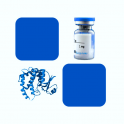
- Remove this product from my favorite's list.
- Add this product to my list of favorites.
Products
Newsletter
 |  |  |  |  |  |

Background
Kinase insert domain receptor (KDR) is also known as CD309, FLK1, VEGFR, VEGFR2, and is one of the subtypes of VEGFR. VEGF receptors are receptors for vascular endothelial growth factor (VEGF). There are three main subtypes of VEGFR, numbered 1, 2 and 3. The VEGF receptors have an extracellular portion consisting of 7 immunoglobulin-like domains, a single transmembrane spanning region and an intracellular portion containing a split tyrosine-kinase domain. VEGF-A binds to VEGFR-1 (Flt-1) and VEGFR-2 (KDR/Flk-1). VEGFR-2 appears to mediate almost all of the known cellular responses to VEGF.The function of VEGFR-1 is less well defined, although it is thought to modulate VEGFR-2 signaling. Another function of VEGFR-1 may be to act as a dummy/decoy receptor, sequestering VEGF from VEGFR-2 binding (this appears to be particularly important during vasculogenesis in the embryo). In addition, VEGFR2 is able to interact with HIV-1 extracellular Tat protein upon VEGF activation, and seems to enhance angiogenesis in Kaposi's sarcoma lesions.
Source
Recombinant Biotinylated Human VEGF R2, Avitag,His Tag (KDR-H82E5) is expressed from human 293 cells (HEK293). It contains AA Ala 20 - Glu 764 (Accession # AAI31823).
Predicted N-terminus: Ala 20
Molecular Characterization
This protein carries an Avi tag (Avitag™) at the C-terminus, followed by a polyhistidine tag.
The protein has a calculated MW of 85.9 kDa. The protein migrates as 120-150 kDa under reducing (R) condition (SDS-PAGE) due to glycosylation.
Biotinylation
Biotinylation of this product is performed using Avitag™ technology. Briefly, the single lysine residue in the Avitag is enzymatically labeled with biotin.
Biotin:Protein Ratio
Passed as determined by the HABA assay / binding ELISA.
Endotoxin
Less than 1.0 EU per μg by the LAL method.
Purity
>95% as determined by SDS-PAGE.
Formulation
Lyophilized from 0.22 μm filtered solution in PBS, pH7.4 with trehalose as protectant.
Reconstitution
Please see Certificate of Analysis for specific instructions.
For best performance, we strongly recommend you to follow the reconstitution protocol provided in the CoA.
Storage
For long term storage, the product should be stored at lyophilized state at -20°C or lower.
Please avoid repeated freeze-thaw cycles.
This product is stable after storage at:
-20°C to -70°C for 12 months in lyophilized state;
-70°C for 3 months under sterile conditions after reconstitution.
Bioactivity
Please refer to product data sheet.
(1) "Twenty-Four week Taichi training improves pulmonary diffusion capacity and glycemic control in patients with Type 2 diabetes mellitus"
Liu, Zhu, Peng et al
PLoS One (2024) 19 (4), e0299495
(2) "Anti-VEGF treatment for secondary neovascularization in pseudoxanthoma elasticum - age of onset, treatment frequency and visual outcome"
Raming, Pfau, Herrmann et al
Am J Ophthalmol (2024)
(3) "Mesenchymal stromal cell extracellular vesicles improve lung development in mechanically ventilated preterm lambs"
Albertine, Rebentisch, Dawson et al
Am J Physiol Lung Cell Mol Physiol (2024)
Showing 1-3 of 1086 papers.
Follow us